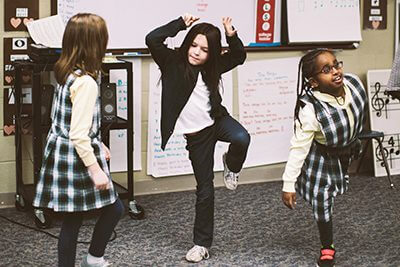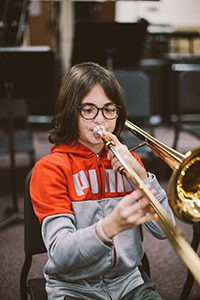September 11, 2019

Music And The Brain
Music isn’t just something that’s good for your brain—it practically is your brain. Studying music is intrinsically tied to better hearing, speech, memory, reasoning, and emotional development. It lifts mood, builds community, and strengthens confidence. Music matters for long-term physical and psychological wellbeing, and to preserve brain health as we age. In terms of academic success, music education is directly connected to overall student achievement and personal growth, and it plays an essential role in Mounds Park Academy’s whole child, progressive, college preparatory curriculum, PreK through grade 12.
Building Social, Intellectual Capacity
According to recent research conducted by neuroscientists at the University of Southern California’s Brain and Creativity Institute, early education in music was shown to accelerate brain development in young children, especially in the parts of the brain that manage sound, language, speech perception, and reading skills. As described by neuropsychologist Catherine Loveday of the University of Westminster, “music reaches parts of the brain that other things can’t … it’s a strong cognitive stimulus that grows the brain in a way that nothing else does, and the evidence that musical training enhances things like working memory and language is very robust.”
That’s no surprise to Mari Espeland, Lower School music teacher and a faculty member at MPA for the past 30 years, who reinforces that “music is for everyone, and is a discipline that equally engages the heart and the brain.” She explains that “music compels you to listen, to learn, to collaborate, to cooperate. It facilitates problem solving, teamwork, and compassion. It is a key social and life skill that fosters important cultural capabilities. For example, learning music allows you to lull a baby to sleep, to dance at a wedding, and to sing your school song and the National Anthem. It builds emotional intelligence and functional ability, helping us navigate life phases and relate better to each other.”

Interdisciplinary Skills, Interpersonal Connections
Espeland sees her students build intellectual and interpersonal pathways through music, and also reflects on what studying music can mean as societies and economies continue to evolve. “The world is changing fast, and we don’t know exactly what future jobs and careers will look like,” she says. “But, no matter the specifics of our work, we know that successful adults will need the adaptive, intuitive, interpretive skills that music education cultivates.” She underscores that MPA’s unique approach to music education emphasizes that knowing how is more important than knowing that. “We have data, facts and figures, at our fingertips. Anyone can memorize that information. I want students to learn the how. For example, do they understand music as a language that you can hear, read, and write? Can they decode and resolve complex rhythms? Can they create a musical sequence, and engage their peers in building that sequence into something that an ensemble can recreate? Do they understand how music ties to other types of human expression?”
Music is infused throughout every grade level at MPA. The Lower School program incorporates songs, dances, and singing games drawn from world cultures and the diverse music of the United States. Children share music and movement they’ve learned at informal and formal performances throughout the school year, and progress to notate their own compositions. Moving into Middle School, students join either band or orchestra in addition to participating in choir, laying the foundation for continuing development in the coming years of vocal and instrumental music study. Upper School creates opportunities for students to hone their musical technique and expertise through six different instrumental ensembles and three choral groups, in addition to MPA students being regularly selected for state honor choirs, bands, and orchestras.
Joy, Beauty, And Community
The research is clear: music makes us better thinkers and problem solvers. It builds memory and strengthens communication. There are many tangible reasons to study music, especially knowing it can serve as an influential lever to advance academic success. “But let’s not forget,” says Espeland, “that we also study music because it is beautiful, because it gives us peace and comfort. There are few things as wonderful as singing with a group of people, creating that shared sound and generating something greater than yourself. I’m so privileged to get to do that every day, with such amazing students and with the support of my colleagues. I really do have the best job in the whole world.”
Learn More About It: Music and the Brain
- Six benefits of music lessons from Parents magazine, including what to consider when helping your child choose an instrument.
- Inspiration for adults, with a call to action for learning music later in life.
- A compelling review of the Impact of Music, from school readiness to health and wellbeing.
- Statistics and linkage between music education and academic achievement, including higher performance in math and English.
Mounds Park Academy, a PreK-12 private school in Saint Paul, is currently accepting inquiries for the 2020-21 school year. For more information about admission and to schedule your tour, visit moundsparkacademy.org/admission. We look forward to getting to know your family!